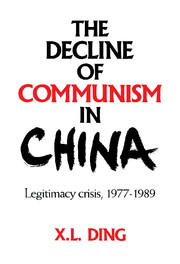Book contents
- Frontmatter
- Contents
- List of tables and figure
- Preface
- List of abbreviations
- Introduction
- Part I
- Part II
- 3 The movement to “emancipate the mind” and the counterelite's response
- 4 “Building socialist spiritual civilization” and the counterelite's response
- 5 Two contending patriotic campaigns
- 6 Admission of the “primary stage of socialism” and the counterelite's two developmental models
- Concluding remarks
- Appendix: Notes on methods and methodology
- Selected bibliography
- Index
4 - “Building socialist spiritual civilization” and the counterelite's response
Published online by Cambridge University Press: 17 September 2009
- Frontmatter
- Contents
- List of tables and figure
- Preface
- List of abbreviations
- Introduction
- Part I
- Part II
- 3 The movement to “emancipate the mind” and the counterelite's response
- 4 “Building socialist spiritual civilization” and the counterelite's response
- 5 Two contending patriotic campaigns
- 6 Admission of the “primary stage of socialism” and the counterelite's two developmental models
- Concluding remarks
- Appendix: Notes on methods and methodology
- Selected bibliography
- Index
Summary
This chapter is devoted to analyzing the official appeal to socialist morality and its consequences. It describes the sociopolitical background that explains why the Dengist leadership felt it necessary to put great efforts into a massive campaign called “Building a High Level of Socialist Spiritual Civilization” during the first half of the 1980s. It shows how the Dengists' carefully formulated dual-traffic policy, as represented by the appeal to socialist morality, was attacked from both sides.
The hard-liners in the military and party establishment were angry about the Dengist leadership's partial concessions to the functional requirements of modernizing China, for example, opening to the outside, stress on the development of science and education, and respect for technical personnel. They worried that the partial concessions would lead to total decay of the structural uniqueness of Chinese communism.
The counterelite opened fire on the dual-traffic policy from the opposite direction. It was angry about the Dengist leadership's retreat from the commitment to “material civilization” – that is, to modernizing China – and protested that preservation of “socialist uniqueness” could only suffocate the vitality and dynamism recently regenerated in Chinese society through openness. It therefore strove to remove from the official agenda all ideas and policies incompatible with modernizing China.
- Type
- Chapter
- Information
- The Decline of Communism in ChinaLegitimacy Crisis, 1977–1989, pp. 114 - 139Publisher: Cambridge University PressPrint publication year: 1994



